Oncobesity News Posts

Is ozempic forever? UK surgeon explains how GLP-1 drugs work, and whether you need to take them indefinitely
If you are considering GLP-1 drugs for weight loss, it might be a more serious commitment than you expected. Dr Rajan explains how they work.

Struggling with chronic stress? Wellness coach shares 7 nutrients to lower cortisol and boost GLP-1 naturally
Chronic stress not only makes you feel overwhelmed but can also deplete key nutrients and mess with hormones. Rachel shares 7 nutrients that can help.
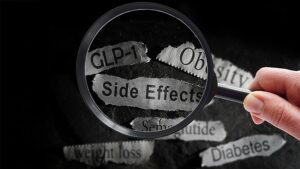
Urgent warning issued for Ozempic after GLP-1 drugs linked to suicide
New precautions added for GLP-1 drugs as reports of mood changes and contraceptive concerns emerge in Australia.
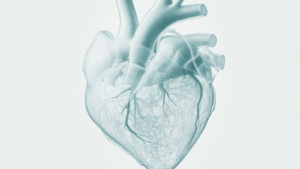
Cardiovascular benefits of GLP-1 drugs independent of weight loss
Revising our earlier interpretation of SELECT trial data in light of new analyses The post Cardiovascular benefits of GLP-1 drugs independent of weight loss appeared
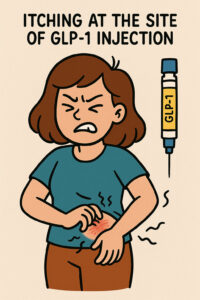
Itching at the GLP-1 site of injection
Some people will get itching at the site of injection of the GLP-1 drugs. This is not common but is irritating. There are some things you can do to lessen the severity of the reaction.

Trump Cuts Prices on Ozempic and Wegovy in Deal With GLP-1 Weight Loss Drug Makers
President Trump’s plan drops the price of Ozempic and Wegovy for Americans, with plans for Medicare to cover the popular GLP-1 weight loss drugs.
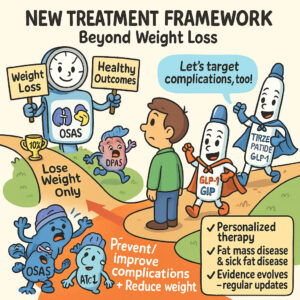
EASO Framework for Pharmacological Obesity Treatment – Sick Fat vs. Fat Mass
A framework published by the European Association for the Study of Obesity (EASO) that addresses the pharmacological treatment of obesity and its complications. This framework proposes a new

Surgery beats Ozempic for long-term health, Cleveland Clinic finds
Weight-loss surgery dramatically outperformed GLP-1 medications in improving longevity and reducing heart, kidney, and eye complications for people with obesity and diabetes. Over 10 years, patients lost far more weight and required fewer medications. Experts say surgery continues to offer survival advantages even in the age of potent obesity drugs.
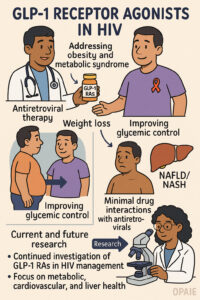
💪 The HIV and Weight Loss Drugs Connection – GLP-1 Agonists in HIV Management
The provided source explores the increasing use of GLP-1 receptor agonists like semaglutide and liraglutide in individuals with HIV. It highlights that these medications are beneficial for addressing obesity

💲 Medicare’s Weight Loss Drug Experiment: Costs & Coverage
A Washington Post article talks about the Trump administration experiment to expand Medicare and Medicaid coverage for GLP-1 weight loss drugs like Ozempic, potentially benefiting millions of Americans
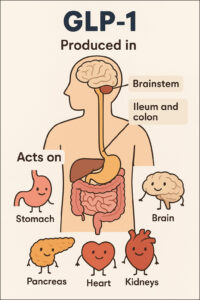
Where is GLP-1 is produced and where in the body does it act?
The provided text describes glucagon-like peptide-1 (GLP-1), detailing its production and the wide array of organs and systems it affects. Primarily, GLP-1 is generated in the intestinal
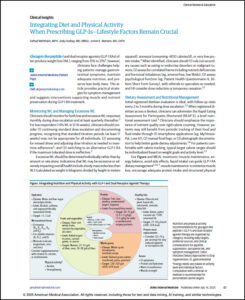
⚖️ GLP-1s: Integrating Diet and Activity for Optimal Outcomes
This JAMA article provides comprehensive guidance for clinicians on integrating diet and physical activity when prescribing GLP-1 receptor agonists for weight management. It outlines strategies for monitoring and
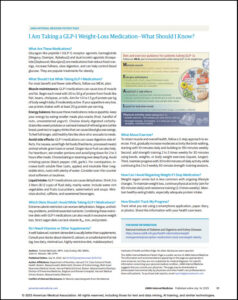
⚖️ Navigating GLP-1 Weight Loss: Diet, Exercise, and Well-being
This patient-focused guide from JAMA Internal Medicine provides essential information for individuals utilizing GLP-1 medications for weight loss. It outlines the medications’ functions and offers practical dietary advice through a “MEAL” plan, emphasizing muscle

🧪 Unregulated Additives in Compounded GLP-1 Medications
The practice of compounding pharmacies adding various supplements to GLP-1 receptor agonist formulations like semaglutide or tirzepatide is very common in the United States. These additions, which
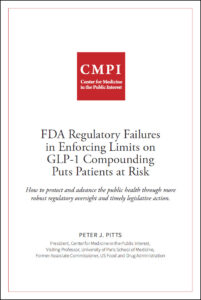
⚠️ FDA Failures and GLP-1 Compounding Risks
“FDA Regulatory Failures in Enforcing Limits on GLP-1 Compounding Puts Patients at Risk,” critically examines the Food and Drug Administration’s (FDA) oversight of compounded GLP-1 medications.
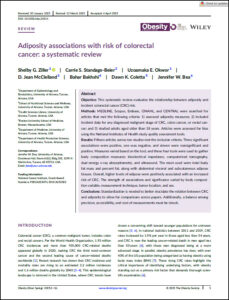
🤢 Adiposity and Colorectal Cancer Risk: A Systematic Review
A systematic review investigating the relationship between adiposity measures and the risk of developing colorectal cancer (CRC), building upon existing research that often relies solely on Body Mass

💪 GLP-1s: Diabetes, Weight Loss, and Cancer Reduction
This source explores the impact of semaglutide, a weight loss medication, on muscle mass, glucose regulation, and bone health in adults with obesity. It highlights
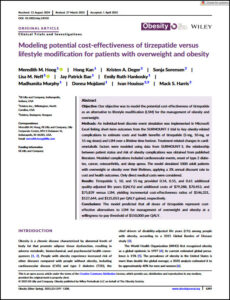
💲 Tirzepatide: A Cost-Effective Path to Obesity Management
This academic article presents a cost-effectiveness analysis of tirzepatide, a medication for managing overweight and obesity, comparing it against lifestyle modification (LSM) alone. Researchers used a simulation model to project lifetime health
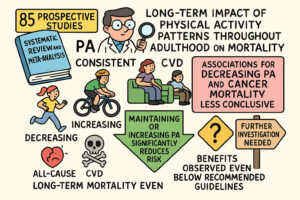
🏃 Physical Activity Trajectories and Mortality: A Meta-Analysis
A systematic review and meta-analysis of 85 prospective studies, examining the long-term impact of physical activity (PA) patterns throughout adulthood on mortality. The authors aimed to understand how consistent, increasing,
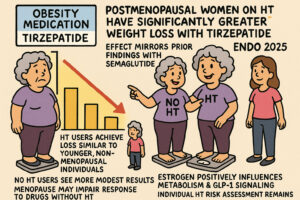
Hormone Therapy Enhances Tirzepatide Weight Loss in Menopause
The source discusses research indicating that postmenopausal women on hormone therapy (HT) experience significantly greater weight loss when treated with tirzepatide, an obesity medication, compared
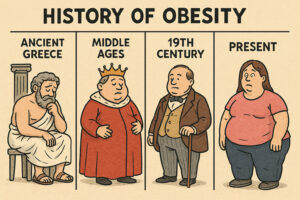
⚖️ The History of Obesity
The provided text offers a comprehensive overview of how obesity has been understood and depicted across different historical periods, from ancient civilizations to the present day. It traces
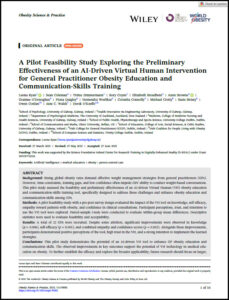
👨⚕️ AI-Driven Virtual Human for GP Obesity Training
This document presents a pilot feasibility study published in “Obesity Science & Practice” that investigates the effectiveness of an AI-driven Virtual Human (VH) intervention designed to enhance General Practitioner (GP)
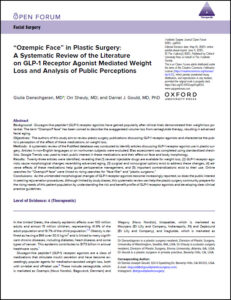
👵 Ozempic Face: GLP-1 and Aesthetic Surgery
This scholarly article from Aesthetic Surgery Journal Open Forum discusses the phenomenon of “Ozempic Face,” a term used to describe the accelerated facial aging and volume loss experienced by some patients

✨ GLP-1s and Post-Weight Loss Plastic Surgery Trends
There is growing evidence—especially in the plastic surgery community—that the recent surge in GLP‑1 medications (like Ozempic, Wegovy, Mounjaro) for weight loss is fueling a

💉 Counterfeit Ozempic: FDA Warns of Unsafe Drug Supply (4/14/2025)
The provided text, originating from the Food and Drug Administration (FDA), serves as a crucial public health warning regarding counterfeit Ozempic (semaglutide) injections found within the U.S. drug
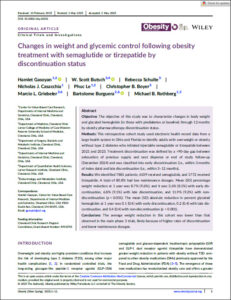
Obesity Treatment Outcomes with Semaglutide or Tirzepatide
This original research article examines the real-world effectiveness of semaglutide and tirzepatide for obesity treatment, focusing on how medication discontinuation impacts weight loss and glycemic control. The retrospective cohort study analyzed electronic health records from

Unpacking the GLP-1 Gold Rush
We ask experts for their views on the GLP-1 market in this exclusive eBook. GLP-1 receptor agonists have rapidly evolved from niche diabetes drugs to

Your Weight Matters Region
Your Weight Matters Regional is traveling the country, bringing expert-led education and practical guidance to cities near you. These FREE half-day events are designed to
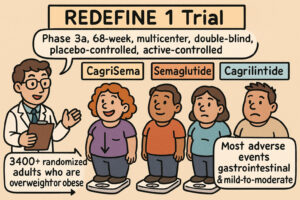
CagriSema: Weight Loss in Overweight or Obese Adults
This document details a Phase 3a, 68-week, multicenter, double-blind, placebo-controlled, and active-controlled clinical trial (REDEFINE 1) investigating the efficacy and safety of cagrilintide–semaglutide (CagriSema) for weight loss in adults
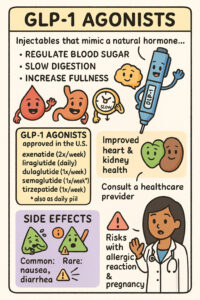
GLP-1 Agonists: Uses, Mechanism, and Side Effects
https://my.clevelandclinic.org/health/treatments/13901-glp-1-agonists The provided text from the Cleveland Clinic offers a comprehensive overview of GLP-1 agonists, a class of medications primarily used to manage Type 2 diabetes and obesity. It explains how these

Orforglipron for Early Type 2 Diabetes Management
This scientific paper presents the ACHIEVE-1 trial, a phase 3 study investigating orforglipron, an oral, nonpeptide GLP-1 receptor agonist, for treating type 2 diabetes. The research evaluates its efficacy

ADA (American Diabetes Association) June 20-23 Obesity Medicines – Other Posters and Talks
🧪 NA‑931 (Bioglutide™) – Biomed Industries, Inc.Presentation (Oral):Title: “Phase 2 Clinical Trials of NA‑931, an Oral Novel Quadruple IGF‑1, GLP‑1, GIP, and Glucagon Receptor Agonist,
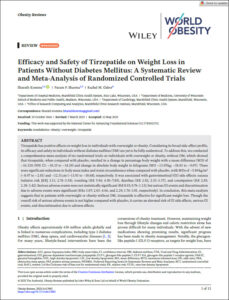
Tirzepatide for Weight Loss in Non-Diabetics: A Meta-Analysis
Kommu S, Sharma PP, Gabor RM. Efficacy and Safety of Tirzepatide on Weight Loss in Patients Without Diabetes Mellitus: A Systematic Review and Meta-Analysis of

Wikipedia and the Weight Loss Drugs
Wikipedia is a free, multilingual, web-based, and openly editable encyclopedia maintained by a global community of volunteers. It’s hosted by the non-profit Wikimedia Foundation. Wikipedia offers articles on
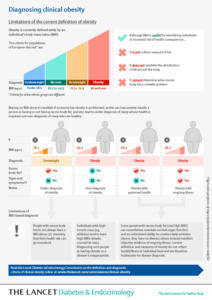
Defining Clinical Obesity
Definition and diagnostic criteria of clinical obesityRubino, Francesco et al.The Lancet Diabetes & Endocrinology, Volume 13, Issue 3, 221 – 262 The Lancet Diabetes & Endocrinology
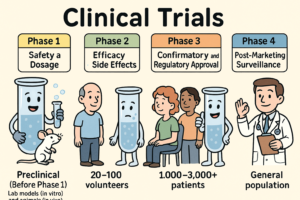
What are Clinical Trials and why do we need them?
Clinical trials are carefully designed research studies conducted in humans to evaluate the safety, efficacy, and overall benefit of medical interventions such as drugs, biologics,

What is “Enforcement Discretion” (FDA context)?
Enforcement discretion means that a regulatory agency like the FDA (U.S. Food and Drug Administration) chooses not to enforce certain rules or regulations under specific
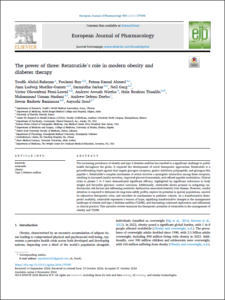
Retatrutide: A Triple Agonist for Diabetes and Obesity
Abdul-Rahman T, Roy P, Ahmed FK, Mueller-Gomez JL, Sarkar S, Garg N, Femi-Lawal VO, Wireko AA, Thaalibi HI, Hashmi MU, Dzebu AS, Banimusa SB, Sood
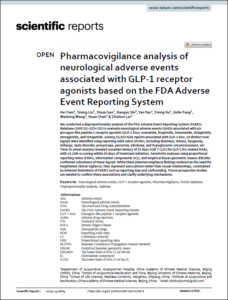
GLP-1 Agonists and Neurological Adverse Events in FAERS
Chen H, Liu S, Gao S, Shi H, Yan Y, Xu Y, Fang J, Wang W, Chen H, Liu Z. Pharmacovigilance analysis of neurological adverse
Camurus: Advancing Patient Care Through Innovation with FluidCrystal®
Drug delivery for incretins refers to how medications that mimic or enhance the activity of incretin hormones—primarily GLP-1 (glucagon-like peptide-1) and GIP (glucose-dependent insulinotropic polypeptide)—are
